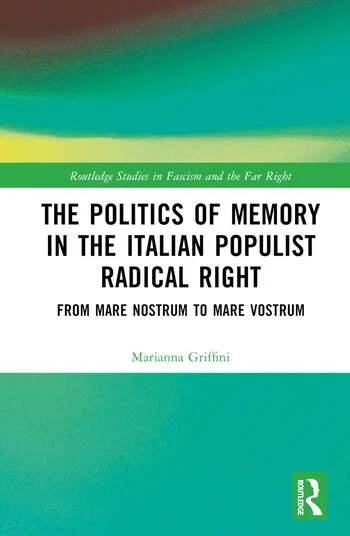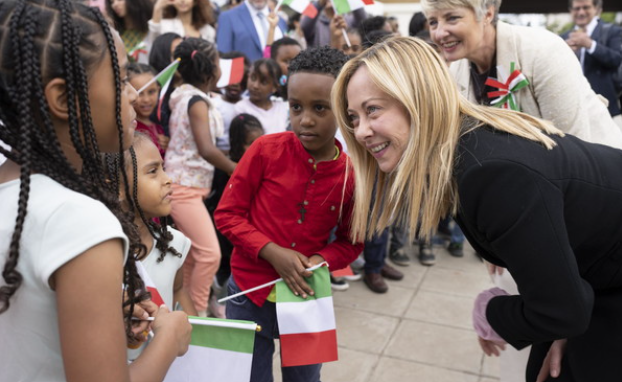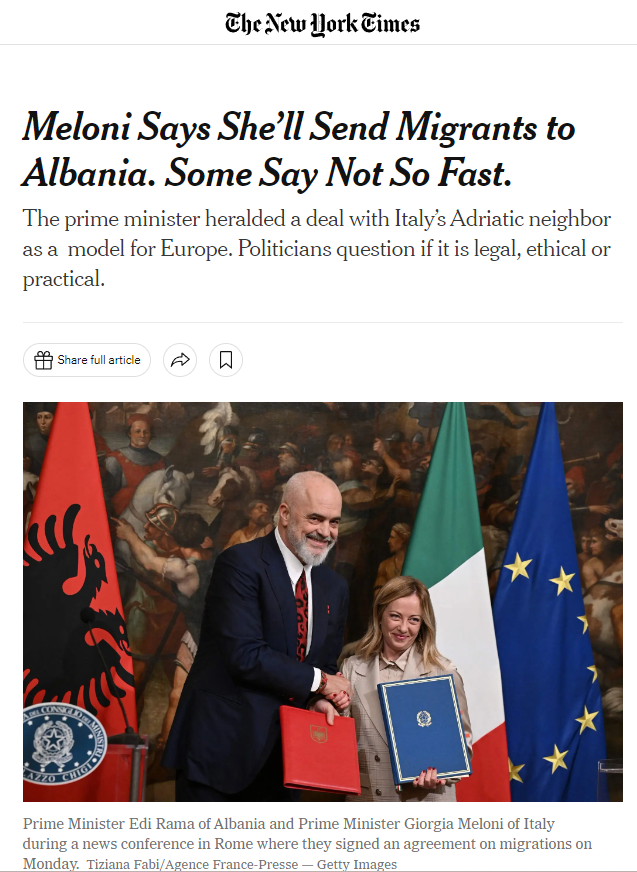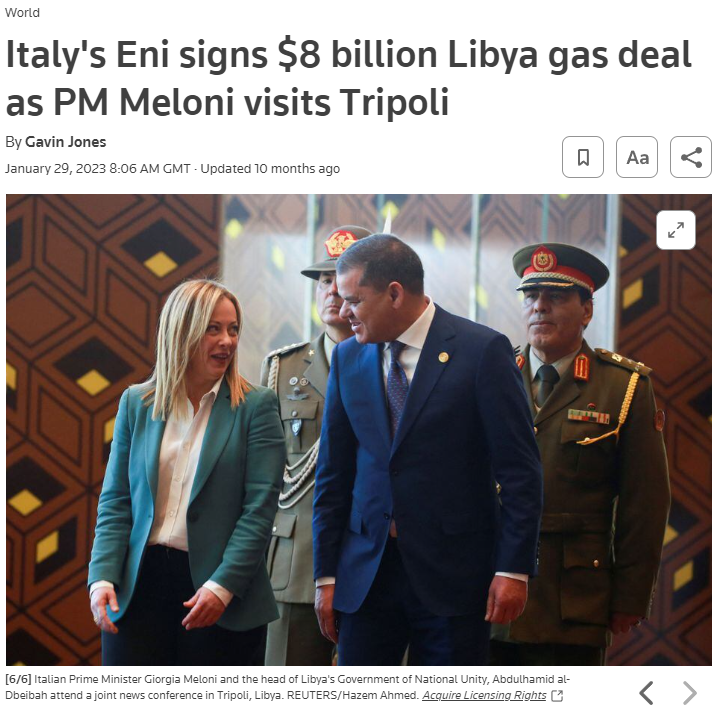The Italian Prime Minister Giorgia Meloni is in power since one year, and she has been very busy opening an exhibition in Rome about J.R.R. Tolkien (one of her old obsessions, we talked about it in one of the last interviews, here). But this is far from the only thing she has been busy with during the last 12 months. She also devoted quite some time to official visits to former Italian colonies such as Libya, Albania, and Ethiopia, discussing issues linked to energy, migrants, and infrastructures.
Last May, I went to King’s College (London) for the presentation of Marianna Griffini’s book ‘The Politics of Memory in the Italian Populist Radical Right’. It was a very interesting event, with great discussions about the contemporary far right and its selective memory of the colonial past. I revised my notes for the event’s introduction and pulished them as an article for Jacobin (here, in Italian).
Since then, the relevance of the Italian colonial past has done nothing but increasing, and it could have been hardly different with the far-right government currently in power. In this interview, we discuss with Marianna Griffini the removal of the country’s past, the role of the far right in this process, as well as current and future developments.
Enjoy the read.
1) You wrote a book titled ‘The Politics of Memory in the Italian Populist Radical Right’. Where did the idea (and maybe the need) to write such a book come from?
MG: Much of my work to date has centred around an interdisciplinary approach to party politics and questions of race, gender, and memory. This book is the product of a research interest sprung up during my undergraduate and postgraduate studies, which, then, constituted the intellectual drive for my PhD project. Indeed, during my studies at the LSE, I became very interested in nationalism studies. Particularly, I started to be very fascinated by the connections between nationalism and colonialism, which were unknown to me. When I was in high school in Italy, the curriculum had glossed over the Italian colonial past, relegating it to the margins of footnotes.
At the same time, during my undergraduate and postgraduate degrees in the early-to-mid 2010s, Italy witnessed turning points in its history as a country of immigration: anti-immigrant attitudes were rampant; the far right affirmed itself onto the political scene as a renovated and major actor, with Matteo Salvini at the helm of the long-established Lega, and Giorgia Meloni heading the newly-founded Fratelli d’Italia; the so-called ‘migration crisis’ was about to begin. Let us not forget that in 2013, on October 3rd, Italy witnessed the biggest number (up until then) of migrants drowned in a shipwreck off the coast of Lampedusa, an island perched on the southern border of Italy.
This political environment characterised by immigration from former colonial countries on one hand, and nationalist anti-immigration sentiment on the other hand, prompted me to delve deeper into understanding their interrelation, and sparked my reflections on the astounding lack of such discussions in public and political debate in Italy. It is, indeed, this lack of acknowledgement in my country of origin that created the necessity to uncover the entanglement between the hostility against immigrants and the colonial past. My PhD research served as the incubator for my broader project that resulted in the book, thanks to further research and fieldwork.

2) How would you describe the collective memory that Italy built around its colonial past after the end of the Second World War and the passage to democracy? What kind of bias and distortion is it possible to detect?
MG: The collective colonial memory shaped by Italy after the end of the Second World War and the start of the democratic state set-up was virtually non-existent. Popular culture, composed of movies, TV shows, and advertisements, was perfectly in line with the colonial attitude of representing the non-Italian Other (i.e. those not belonging to the Italian national group) as backward, inferior, and prone to being caricatured. It is interesting to note that the post-War immigrant Other in Italy was the heir to the colonial Other in the pre-War period. Even if not the direct descendants of the colonised, the few immigrants that started to arrive onto Italian shores were fleeing the same countries that had been once colonial possessions of Italy and of other major European colonising powers. The academic realm offered no deeper understanding and more critical interpretations of the Italian colonial past: until the 1980s, critical colonial memory remained buried as if it were a taboo in Italian educational institutions and among intellectual circles. Instead, it was a glorifying and idealising revisited memory of the Italian colonial venture that still predominated textbooks and academia.
3) In the framework of such a collective memory, what was the role of the Italian far right in promoting revisionist accounts of the country’s colonial past over time?
MG: Exactly, you use the term ‘revisionist accounts’, which aligns well with my qualification of Italian colonial memory after the Second World War as being ‘revisited’. Here a caveat must be made: the most immediate connection between the far right and the post-War Italian political party scene would be the Movimento Sociale Italiano (MSI), the direct successor of the Fascist Party. The MSI is more properly defined as a neo-fascist party, espousing violence and adopting fascist tropes and symbols. It would seem intuitive, then, that the MSI was imbued with a revisionist colonial memory. However, the MSI very rarely touched upon the topic of colonial memory, as I argue in my book. It was the MSI’s heir Alleanza Nazionale (AN), which brought Italian colonial memory into the political debate, though not still at the forefront. The act of remembering the colonial past remained and is still marginal in the political ideology and in political debates in Italy. This is an element that testifies to the Italian reticence in dealing with the colonial past, within and without politics and academia.

Victor Emmanuel III, King of Italy (1900-1946), Emperor of Ethiopia (1936–1941) and King of the Albanians (1939–1943).
4) And today? With far-right parties such as Lega and Fratelli d’Italia in power, how is the far right exploiting the past for its own electoral and political purposes?
MG: Paradoxically, neither the Lega nor Fratelli d’Italia (FdI) have explicitly engaged with celebrations or negations of the Italian colonial memory. However, their policies and discourses are often reminiscent of the sugar-coated colonial memory described above, which triumphed in Italy since the post-War period obscuring more critical appraisals. Generally, the Italian far right has negated the contentious elements of Italy’s colonial past, thus ‘silencing’ them. As I argue in the book and in this article, this selective ‘silencing’, equivalent to selective forgetting of Italian wrongdoings in the colonies, is solidly ingrained in Italy’s myth of Italiani brava gente, which depicted Italians as incapable of any wrongdoing. This selective forgetting is set side by side with the subtle resurfacing of colonial attitudes towards the contemporary Other, i.e. the immigrants, who are described as not belonging to the national in-group of Italians. Indeed, Lega and FdI distance themselves from racism, but their discourse on immigration reproduces colonial discursive categories: Othering, criminalisation, inferiorisation, and degradation of the then Colonial Others, and the now immigrant Others.
5) Last April, PM Giorgia Meloni (Fratelli d’Italia) went to Ethiopia, a former colony, to push forward a so-called ‘Mattei plan’ that connects energy infrastructures and migrants’ management. Seeing Meloni triumphantly greeted by hundreds of smiling children, complete with Italian flags, makes a very strange impression considering the past between the two countries. Hundreds of thousands of Ethiopian civilians died as a result of the Italian invasion, which have been described by some historians as constituting genocide. Italy even used mustard gas in aerial bombardments over Ethiopia, in violation of the Geneva protocols. How do you think that Italian memory (or dismemory) of its own colonial past can contribute to this kind of historical short-circuits?

Meloni in Addis Ababa
MG: Meloni’s ‘triumphal’ visit to Ethiopia in Spring 2023 is a landmark in the history of Italian relations with its former colony, brutally conquered by Mussolini. On that occasion, Meloni lauded the ‘Italian way of development’, meant to bring progress without exploitation. At the same time, while projecting a maternal image of herself hugging Ethiopian children, she brushed off a journalist’s question about the Italian colonial past. Although Ethiopia is not one of the biggest sending countries in terms of immigrant arrivals in Italy, Meloni’s wilful cancellation of the colonial past and lack of recognition of its atrocious deeds creates the historical short-circuit you mentioned in your question. When a founding element of the past is selectively forgotten, identity is constructed in an idealised way, purified from wrongdoings. This exculpatory construction of Italian national identity does not allow Italy to embark on a comprehensive assessment of its colonial misdeeds, tainted by racism. Though coated under a deceiving mantle of ‘civic’ language, such racism re-emerges frequently in the Italian far right’s discourse on immigrants. Therefore, short-circuits in memory contribute to hostile attitudes against immigrants.
6) Italy and Albania reached an agreement to direct thousands of migrants to the Balkan nation while their asylum applications are under review. Albania is another former colony (or ‘protectorate’), and in the late 1990s (following the Albanian civil war) tens of thousands of Albanians reached Italy on overcrowded boats. While the colonial past is mostly forgotten, we remember very well the ‘fear of the Albanians’ generated by this mass migration at the end of the 1990s. In light of your book’s findings, how do you read the recent agreement between Meloni and the Albanian Prime Minister Edi Rama? Why did Italy choose a former colony to manage its migrant’s flow?

MG: Against a backdrop of increased hostility towards immigrants in the Italian population (according to a survey by Demos carried out in September 2023), the sharpening of the Italian far right’s anti-immigrant calls, and Italy’s souring relations with the EU in immigration matters, it comes as no surprise that Meloni circumvented the EU to sign an agreement with the non-EU country located right across the Adriatic Sea. I believe that the reasons underpinning the choice of Albania as a partner in the agreement on the externalisation of Italy’s borders in the management of immigration are to be found in the complex strategic aims of both countries. Albania is seeking Italy’s support for its application to access the EU, while Italy is seeking a partner cooperating on immigration management, after being allegedly let down by the EU. The relationship between Italy and Albania, as you said, has a long and troubled history, but to state that this has been motivating the choice of Albania as a partner for Italy’s bilateral agreement would be a stretch, given the more pressing and immediate concerns faced by both Albania and Italy. Colonial memory has, again, escaped the Italian political and public recognition, apart from a few instances of intellectuals and media shedding light onto it.
Nevertheless, this historical relationship is paramount in illuminating the deeper roots of the agreement. Albania was occupied under fascist colonialism, and later on became the main country of origin of the substantial immigration flows into Italy in the early 1990s. Indeed, the anti-immigrant stance of the Italian far right, a combination of nationalism and racism, became obvious when Italy faced the unprecedented arrival of Albanian immigrants fleeing war, desperation, and destruction. The depiction of Albanian immigrants as criminal, inferior, and filthy permeating the far-right imagery in the early 1990s became soon transposed onto the depiction of the immigrant coming from North Africa and the Middle East through the Mediterranean. It is paradoxical that a former colony later became the country of origin of mass immigration, while now it has been turned into a pawn on the chessboard of Italy’s externalisation of immigration management.

7) In conclusion, your book mentions the switch from the fascist idea of ‘Mare Nostrum’ to the contemporary ‘Mare Vostrum’. Tell us about this switch, and explain how the far right is exploiting the shortcomings of the European Union in managing the influx of migrants.
MG: Anti-immigration attitudes are one of the riding horses of the Italian far right, and a major factor contributing to its electoral success. The contemporary idea of the Mediterranean Sea, however, stands in stark contrast with the colonial and fascist vision of the Mediterranean as a key element for Italy’s grandeur. In my book, I translated the above-mentioned contrast into the shift in the conceptualisation of the Mediterranean from a treasured Mare Nostrum, to an abhorred Mare Vostrum, i.e., the place through which allegedly problematic, different, criminal, inferior, and abject immigrants are washed up onto Italian shores. Through a curious twist of fate, the contemporary depiction of immigrants coming through the Mediterranean recalls the image of the colonised Other. Remarkably, today the Mare Vostrum is not only seen as a dangerous space that we must keep at a distance, but it is also removed from the Italian populist radical right’s memory of colonialism.
The Mediterranean is now the central stage for the diplomatic conflict between Italy and the EU. On one side, Italy, now spearheaded by Fratelli d’Italia, is attempting to demonstrate its political clout by calling on the EU to step in and effectively deal with the increased immigration influx from the Mediterranean into Italy. Giorgia Meloni has undergone a partial makeover, toning down her Euroscepticism while maintaining her stance on the necessity for a renewal of the EU respecting member states’ sovereignty. On the other hand, President of the EU Commission Ursula von der Leyen has engaged with Meloni, also visiting the island of Lampedusa after the tragic shipwreck of September 2023. Such engagement, however, did not lead to any concrete solution yet. A concerted effort founded on international cooperation among EU member states to prevent and regulate migration in the Mediterranean is yet to be seen. At the time of writing, eight EU member states have suspended the Schengen agreement, among which Italy, that has reintroduced border checks at the frontier with Slovenia. Immigration through the Mediterranean remains a highly politicised and polarising topic, which catalyses public attention and the electoral ambitions of the far right. The latter envisions the Mediterranean as a Mare Vostrum, detached from the Italian political space and from Italian memory.

Dr Marianna Griffini is Assistant Professor in International Relations and Anthropology at Northeastern University London. Marianna’s research focuses on party politics, especially on populism, the institutionalisation of populist parties, Italian politics, and race and gender. She has taught widely on topics related to comparative politics, democracy, populism, immigration, post-colonialism and International Political Economy. Marianna published her first monograph on The Politics of Memory in the Italian Populist Radical Right: From Mare Nostrum to Mare Vostrum (Routledge) in 2023.

